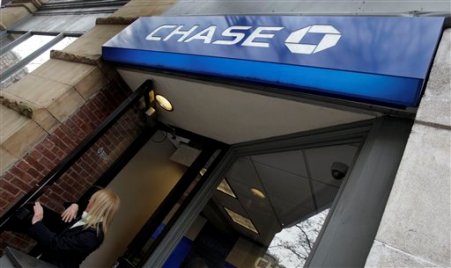The bank's first-quarter profit easily beat expectations, as trading gains helped offset consumer loan losses
JPMorgan Chase & Co.'s first-quarter profit easily beat expectations Wednesday as trading gains helped offset consumer loan losses. The bank's CEO said the economy was showing clear signs of improvement.
JPMorgan Chase, the first of the big banks to report earnings for the January-March period, said it earned $3.3 billion, up from $2.1 billion a year earlier. The company again added to its reserves for failed loans during the quarter, but its investment banking division and other businesses enabled it to more than overcome the ongoing weakness in lending.
Indeed, first-quarter revenue at J.P. Morgan Securities rose 15%, up to $109 million, from the first three months in 2009.
CEO Jamie Dimon offered a more upbeat assessment on the future than he has in the past, saying the economy still faces challenges but is showing "clear and broad-based improvements."
"We believe these improvements will continue and are hopeful they will gather momentum, resulting in a strong recovery," Dimon said.
JPMorgan Chase has been one of the strongest banks as it weathered the financial crisis and recession, so its performance shouldn't be taken as a sign of how well other banks did during the quarter. Many financial companies don't have such big investment banking operations, which includes trading of stocks and bonds and allowed JPMorgan, the nation's largest bank by assets, to overcome its loan losses.
Still, the improvement in its loan business was a good sign for other banks and the economy. JPMorgan Chase said its nonperforming loans, those that are in default or close to being in default, totaled $2.7 billion, up $946 million from a year earlier but a $763 million improvement from the final three months of 2009.
"We continued to see delinquencies stabilize, and in some cases improve, in our credit portfolios," Dimon said. "Ultimately, the health of these portfolios will track the health of the economy."
JPMorgan earned 74 cents per share, easily topping analysts' expectations of 64 cents. Total revenue rose 5 percent to $28.2 billion for the quarter, surpassing forecasts.
Investment banking, especially bond trading, generated the bulk of JPMorgan's profits. The bank said that division earned $2.5 billion, up 50 percent from a year earlier.
While credit losses continued to weigh on the bank's performance, they were less of a drag than in the past. JPMorgan set aside $7 billion for loan losses in the quarter, down 30 percent from a year ago.
JPMorgan said it lost $1.3 billion on its real estate portfolios, slightly more than the $1.1 billion it lost the previous year. Signaling that it expects further credit weakness, the bank set aside $3.3 billion for real estate loan losses, up from $3.1 billion a year earlier.
The bank's losses in its credit card business fell to $303 million, while provision for future credit card losses also dropped to $3.5 billion.
JPMorgan has performed better than other large competitors in part because of its relatively light exposure to troubled subprime mortgages and commercial real estate. It was also among the first banks to repay government bailout money. JPMorgan last year paid back all of the $25 billion it had received at the height of the credit crisis in 2008.
Its relatively stronger foundation than its competitors, which report results in the coming days, helped set JPMorgan up for a quarter that is likely to be among the best in the industry, according to analyst estimates. Bank of America Corp. is scheduled to report earnings on Friday, followed by Citigroup Inc., Goldman Sachs Group Inc. and Morgan Stanley the following week.







